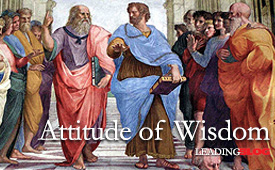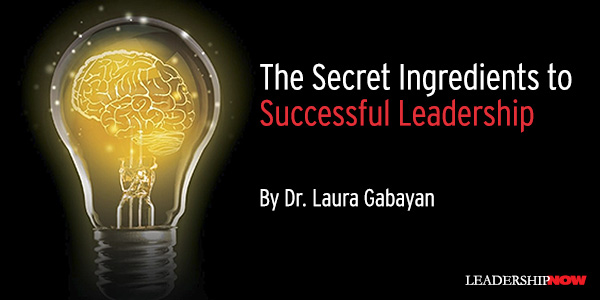The Secret Ingredients to Successful Leadership
EFFECTIVE leadership is an art. Leadership requires keeping several balls in the air at once. Alongside managing the technical aspects of running their company, leaders also have a responsibility for the well-being of those with whom they interact. To be effective, they must not only earn the respect of their employees and communicate skillfully but also inspire team members to do their job effectively.
In an attempt to narrow down which skills are required for being a successful leader, I uncovered eight secret ingredients. Drawing from my background as a physician and scientist, I designed The Wisdom Research Project, which involved interviews with 60 wise adults to find common denominators in their approach toward life. After scientifically analyzing our compiled data, we determined eight qualities that are common to wise people and successful leadership. They involve:
1. Resilience: This is the ability to endure difficulties and “bounce back.” For a leader, resilience is especially important as it involves being flexible, resourceful, and diligent. A resilient leader is able to turn an obstacle into a learning opportunity that will further their knowledge and enable them to thrive. Giving up isn’t an option as it would mean forsaking the company and their career.
2. Kindness: Being friendly, generous, and considerate are all traits associated with kindness and are valued across all societies and organizations. Kind leaders are more effective in inspiring and motivating their employees. Being empathetic is another form of kindness as it involves concern for others’ values, feelings, and priorities. Being kind is professional as it comes from confidence, calmness, and sound judgment. All leaders, at one time or another, must make some tough calls, but incorporating kindness in communicating unpopular decisions helps leaders preserve the respect they’ve earned while taking some of the sting out of their decisions for those involved. Employees want to be part of a company headed by a kind leader as they feel “seen.” As Mark Twain said, “Kindness is the language that the deaf can hear and the blind can see.”
3. Positivity: Being positive in life comes from maintaining an optimistic perspective. Knowing that all the eight elements of wisdom are interrelated, positivity plays into resilience by allowing a leader to approach and view every situation as a learning opportunity. A positive leader looks for opportunities to gain knowledge, and hence become a better leader. Positivity benefits both the leader and company. Leaders who are positive create an air of enthusiasm, openness, and high morale among employees. Workers feel privileged to be there. They’re excited to be part of a team.
4. Spirituality: The idea of spirituality and successful leadership seem to be at odds, but they are intrinsically interconnected. A belief that there’s something greater than oneself, even though it can’t be explained or seen, empowers leaders to govern from a place of purpose, which in turn inspires and motivates employees. Leaders who embrace spirituality influence the team to work from the heart. As a result, team members understand that their purpose transcends material goods and material compensation. They follow the example of their leader’s belief in the mission of the company and are willing to go to great lengths to ensure its success.
5. Humility: As author C.S. Lewis explained in reference to humility: “It’s not thinking less of yourself, but thinking of yourself less.” Humility has been recognized throughout time as an important virtue. Having humility is especially important for effective leadership. A writer for The Economist once stated, “If leadership has a secret sauce, it may well be humility. A humble boss understands there are things he doesn’t know. He listens.” The willingness of such leaders to listen to employees’ ideas magnifies their success as they realize employees often have a better perception of consumers’ needs and priorities.
6. Tolerance: Respecting the beliefs and practices of those around us that differ from our own is a hallmark of tolerance. It involves approaching difference through an unbiased and open-minded lens. A tolerant leader seeks feedback, invites diverse opinions, and is genuinely interested in other perspectives. In this way, they are able to learn from others. Tolerant leaders lack ego, while at the same time conveying confidence. They believe the company’s success is more important than appearing to have all the answers.
7. Creativity: A creative leader looks at scenarios from a different or new perspective. This ability is an important attribute of effective leadership. Leaders who are creative are better able to problem-solve and lead their company on a path of greatness. Such leaders have vision and a sense of innovation. They imagine and think without bias, boundaries, or judgment, which leads them to finding innovative solutions.
8. Curiosity: Curiosity is the foundation of all the elements of wisdom and is essential to effective leadership. At its core is a desire to learn and to pursue new ideas. Curiosity is the component that enables a company to move forward and grow. It invites questions, the pursuit of solutions, and reliance on diverse perspectives — all leading to innovation and success.
While the eight elements intrinsic to wisdom make up the secret ingredients to successful leadership, they take time and intention to effectively implement. Keep in mind that incorporating these elements is a continuous undertaking. Be patient. Know that having an awareness of their importance in leadership is the first step.

Dr. Laura Gabayan is a world-renowned physician and expert in research. Through her Wisdom Research Project, she interviewed 60 wise adults across North America and defined the eight fundamental elements of wisdom. She describes her findings in her new book, Common Wisdom: 8 Scientific Elements of a Meaningful Life. For more information, visit thewisdomresearchproject.com.

![]()


Posted by Michael McKinney at 10:35 AM
Permalink
| Comments (0)
| This post is about Leadership




